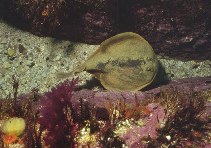| Family: |
Narkidae (Sleeper rays) |
| Max. size: |
38 cm TL (male/unsexed) |
| Environment: |
demersal; marine; depth range 20 - 183 m |
| Distribution: |
Southeast Atlantic: Cape of Good Hope to central Natal, South Africa. Possibly occurring in Namibia, Mozambique and Madagascar (Ref. 5578, Ref. 114953). |
| Diagnosis: |
Small ray with an almost circular disc and an elongated caudal fin (Ref. 5578). Yellowish-brown above with yellowish patches on upper tail, yellow with brown margins below (Ref. 5578). |
| Biology: |
Occurs offshore on the shelf; also common on sandy and muddy bottoms at 20-115 m (Ref. 5578). Feeds mainly on polychaetes (Ref. 5578). Males reaches maturity at 18-23 cm TL, females at ca. 23 cm TL (Ref. 114953). Capable of giving a powerful shock (Ref. 5578). Incidental catch of trawlers (Ref. 5578). It is parasitised by the monogenean Electrocotyle whittingtoni in the gills (Ref. 124060). |
| IUCN Red List Status: |
Least Concern (LC); Date assessed: 24 April 2018 Ref. (130435)
|
| Threat to humans: |
other |
Source and more info: www.fishbase.org. For personal, classroom, and other internal use only. Not for publication.
